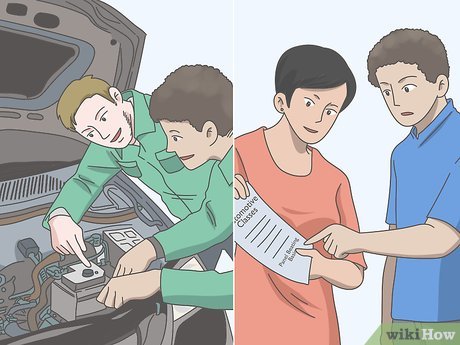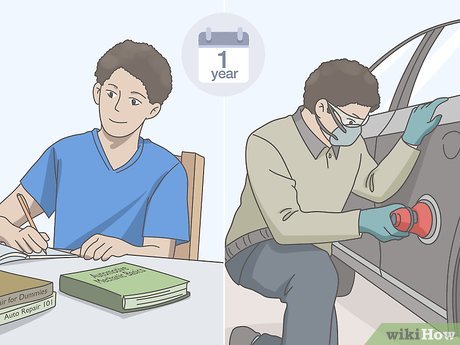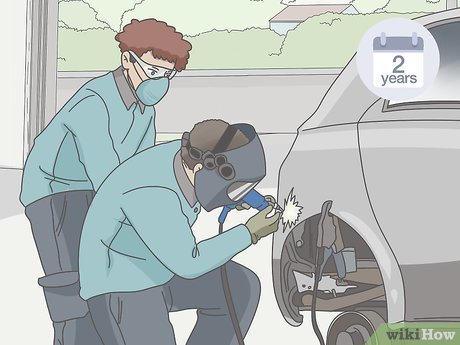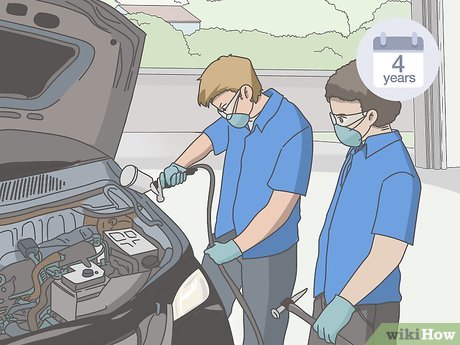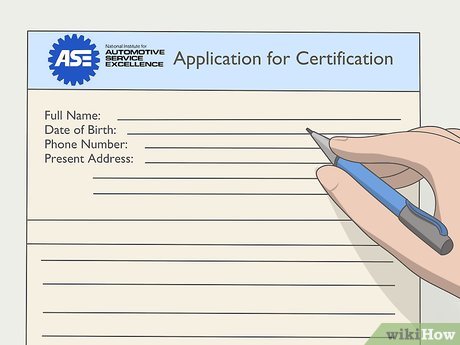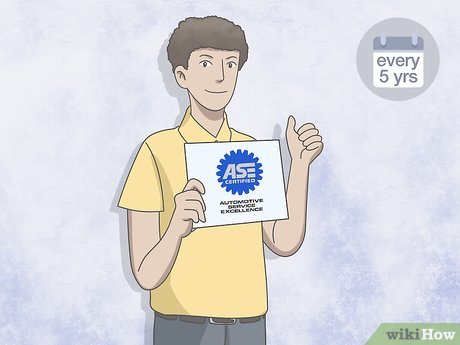How to Become a Panel Beater
Part 1 of 3:
Completing Educational Requirements
-
 Work toward completing high school or getting your GED. Panel beating doesn't have much in the way of educational requirements for you to consider. Still, earning your diploma or GED can open up new opportunities. Some employers and training programs require it. While you're in school, take advantage of any technical training classes available.[1]
Work toward completing high school or getting your GED. Panel beating doesn't have much in the way of educational requirements for you to consider. Still, earning your diploma or GED can open up new opportunities. Some employers and training programs require it. While you're in school, take advantage of any technical training classes available.[1]- The GED is a test you can take if you don't finish high school. It shows that you have the equivalent of a high school education.
- Since there are no official educational requirements, you may still be able to get training and find a job even if you don't have a diploma or GED to show for it.
-
 Join a vocational program if your school has one. Attending a vocational program enables you to get some hands-on training with cars. Many high schools offer technical classes or have partnerships with schools that do. If your school doesn't offer separate panel beater training, get involved with an auto body repair study program. You could also begin training as an automotive mechanic to get some experience.[2]
Join a vocational program if your school has one. Attending a vocational program enables you to get some hands-on training with cars. Many high schools offer technical classes or have partnerships with schools that do. If your school doesn't offer separate panel beater training, get involved with an auto body repair study program. You could also begin training as an automotive mechanic to get some experience.[2]- Speak with your school counselor to see what kinds of classes are available to help you prepare for panel beating.
-
 Take a 1-year training program if you need more experience. Technical and community colleges offer training programs for prospective panel beaters. Check with colleges around your area to see what kind of programs they offer. A 1-year program is designed to teach you the basics of panel beating and give you a chance to gain some experience. Many programs have work placement opportunities to help you land a job after you graduate.
Take a 1-year training program if you need more experience. Technical and community colleges offer training programs for prospective panel beaters. Check with colleges around your area to see what kind of programs they offer. A 1-year program is designed to teach you the basics of panel beating and give you a chance to gain some experience. Many programs have work placement opportunities to help you land a job after you graduate.- College training is a great option for anyone who didn't get vocational training in high school. That includes anyone looking to transition to panel beating from another field.
- While you're training, speak with the school's academic advisor to ensure you take the correct classes and have access to any work placement opportunities the school offers.
-
 Take a 2-year auto body repair program if you want additional training. Many technical and community colleges offer a 2-year associate's degree in auto repair technology. The extra training is very useful for anyone who wishes to learn more about vehicles and the more extensive repairs needed to fix some of them. It may also cover repairing serious collision damage or other car parts a lot of panel beaters don't normally deal with. Some programs also include classes on language, math, and other subjects that come in handy during your work.[3]
Take a 2-year auto body repair program if you want additional training. Many technical and community colleges offer a 2-year associate's degree in auto repair technology. The extra training is very useful for anyone who wishes to learn more about vehicles and the more extensive repairs needed to fix some of them. It may also cover repairing serious collision damage or other car parts a lot of panel beaters don't normally deal with. Some programs also include classes on language, math, and other subjects that come in handy during your work.[3]- Getting a degree usually isn't necessary for panel beaters, but it can be useful if you don't have a lot of experience working on cars. It may also help you qualify for management roles.
- There are also some 4-year programs. For example, some technical schools offer bachelor's degrees in automotive technology.
- Note that most schools that offer degrees also have work-placement programs to help you land an apprenticeship. You can complete your apprenticeship while earning your degree.
Part 2 of 3:
Finding Employment
-
 Apply to companies with open apprenticeships. Search for auto repair workshops in your area and check out what openings they have available. Look for ones that are willing to train new employees. You can usually submit applications online, either through company websites or job posting sites.[4]
Apply to companies with open apprenticeships. Search for auto repair workshops in your area and check out what openings they have available. Look for ones that are willing to train new employees. You can usually submit applications online, either through company websites or job posting sites.[4]- You could also call different workshops or visit them in person. If you express a strong interest in panel beating and have the training, you should be able to find a job.
- Applying for apprenticeships can be a competitive process, so don't give up if you don't get one right away.
- If you attended a college or technical training program, consult your advisor. Your school can link you to prospective employers.
-
 Complete a 4-year apprenticeship to learn the trade. An apprenticeship gives you on-the-job training to prepare you to work on your own. Expect to start out with tasks like helping a more experienced panel beater fix small dents before moving on to tougher repairs. You won't be able to do repair work on your own until you're trained.[5]
Complete a 4-year apprenticeship to learn the trade. An apprenticeship gives you on-the-job training to prepare you to work on your own. Expect to start out with tasks like helping a more experienced panel beater fix small dents before moving on to tougher repairs. You won't be able to do repair work on your own until you're trained.[5]- The length of the apprenticeship period can vary depending on where you are in the world. At a minimum, expect jobs to require at least 2 years of professional experience.
-
 Get hired full-time after completing your apprenticeship. Many companies hire apprenticeships directly after they finish their training. You could also apply to other workshops if you wish to seek new opportunities. You won't need to repeat the apprenticeship period elsewhere. Consider also obtaining certification to make your new career official.
Get hired full-time after completing your apprenticeship. Many companies hire apprenticeships directly after they finish their training. You could also apply to other workshops if you wish to seek new opportunities. You won't need to repeat the apprenticeship period elsewhere. Consider also obtaining certification to make your new career official.- If you have training experience, you can get hired at just about any workshop. However, continue advancing your credentials and staying up to date with the latest technology.
Part 3 of 3:
Advancing Your Career
-
 Apply for certification if it is available in your country. You do not have to get a license to start working as a panel beater, but you may need to get a certificate. Certificates are generally earned by completing a school training program or finishing an internship. You may then have to apply to a government board or professional organization to receive professional certification.[6]
Apply for certification if it is available in your country. You do not have to get a license to start working as a panel beater, but you may need to get a certificate. Certificates are generally earned by completing a school training program or finishing an internship. You may then have to apply to a government board or professional organization to receive professional certification.[6]- Professional certification is like proof of your skills as a panel beater. Certified beaters are more likely to advance to higher roles in a workshop and receive pay raises.
- For example, if you're in the U.S., look into getting certification from the National Institute For Automotive Service Excellence (ASE).
-
 Take a test if it is needed to qualify for certification. Testing organizations like the ASE offer many different types of certification, so choose the one that best applies to your work. ASE certification tests are computer-based and typically consist of 50 to 60 multiple-choice questions. They are meant to measure how much you know about panel beating or another subject the test covers. You can retake the test every 30 days.[7]
Take a test if it is needed to qualify for certification. Testing organizations like the ASE offer many different types of certification, so choose the one that best applies to your work. ASE certification tests are computer-based and typically consist of 50 to 60 multiple-choice questions. They are meant to measure how much you know about panel beating or another subject the test covers. You can retake the test every 30 days.[7]- For example, the B series of tests covers collision repair, including damage analysis, repair, and refinishing. These tests are often good places for a panel beater to start when pursuing certification.
- In a region like Western Australia, you will have to get a Motor Vehicle Repairer's Certificate. This certificate is required for work and requires you to complete a test similar to the ASE.[8]
-
 Get recertified every 5 years if it is required. When your certification expires, reactivate it by taking a recertification test. The test is similar to the one you take when you initially get certified. It is used to prove that you have the knowledge of a skilled professional. Be aware of any changes that have happened in automotive technology since you last took a certification test.[9]
Get recertified every 5 years if it is required. When your certification expires, reactivate it by taking a recertification test. The test is similar to the one you take when you initially get certified. It is used to prove that you have the knowledge of a skilled professional. Be aware of any changes that have happened in automotive technology since you last took a certification test.[9]- Recertification is necessary because panel beating changes over time. You may come across new technology or techniques in your work, which can then show up on a certification test.
- Be sure to read up about any new technology that could impact your score on the recertification test.
Share by
Lesley Montoya
Update 24 March 2020

